Ep16: Will & Faith with Nathan & Andrew

Ascension Workers
Ep16: Will & Faith with Nathan & Andrew
/
RSS Feed
In this episode, Mike, Andrew, and Nathan delve into their reflections on spiritual growth, personal lessons, and archetypal understanding. They explore the development of will and faith, the concept of a transparent personality, and how our experiences and reactions can either obscure or reveal deeper truths about the self and the creator. They also touch on the importance of balancing emotional energies and the transformative power of gratitude and perception.
Next Episode: Ep17: Questioning Identity
Welcome guys to another random recording.
I'm calling a podcast episode with one,
this one with Andrew and Nathan, who are great friends.
And you know, we love to talk about the
loved one books on the other podcast
called The Loved One, deep Dives.
I urge people to check that out,
but I thought this one we can, maybe, it it'd be fun
to spend a little bit, bit less time just focused on reading
quotes and chat about what this means to us right now.
And as we're trying to, um,
as we've been discussing the archetypes
and we're trying to understand what this means,
and as Ross says that the, the use of the archetypes relates
to the development of will and faith.
And also it seems as though we're becoming less
and less of the, the imbalanced distorted self
that the ego that, that we're so often stumbling over.
And we're becoming more and more the,
this like fractualize representation of the creator,
which I think the archetypes are kind of like more like the,
the, the pure geometry of the pure fractals
of the, of the mind of the creator.
As, as we step into this, this, this deeper consciousness,
this, this deeper awareness of, of the, of the creator
as the self and as the creator working
through everything and everyone.
Um, there, there are some effects on our lives that we,
that we observe and we, we have a lot
of lessons that we've learned along the way.
And I think some of those lessons are, you know, challenging
as we maybe face some stumbling
blocks to try to understand them.
But I think that things do get easier, uh, as we start
to fully grasp the lessons and maybe just take more joy
and more gratitude for the lessons that are coming.
And, and I've noticed it almost seems like there,
there are actually like specific things I'm supposed
to learn on a given day, and I don't know
what those things are when I first wake up,
unless maybe I do a, a lot of analysis
of a dream that I might've had.
And I, I, I start to take that to heart more,
which I usually, I usually can't even make a connection
between the dream that I had and the lessons
that I end up having to learn until
after those experiences hit me, which seemed
to be programmed, uh, to happen to me that day.
And I don't, I don't know who's gonna reach out to me
and contact me or what, what it is
that's I'm supposed to be experiencing.
What, what server's gonna crash
or what, what's gonna actually be on my mind that day
until it actually happens, and then it makes sense to me.
Oh, oh, I see that there was, uh, maybe a lack of patience
or there was, um, a certain kind of anxiety that needed
to be, uh, as the loved one sometimes says that there needs
to be accentuation of a distortion in order
to balance that distortion.
Sometimes those things are emphasized.
Um, but I guess I'd like to ask you guys,
um, we could start with Nathan.
Uh, like, are, do you feel like this is a path of noticing
and appreciating lessons more and more that you're on?
Definitely. I, I think kind of
what you were describing there is, is the way I feel too.
It's more of a perspective change.
It almost seems like now that look at a lot of these
teaching things more as opportunities where things
that would really bother me before
or that would, you know,
really weigh on you, I guess, a lot longer.
I can see that now. Okay, there,
there's a lesson to be learned here.
Let me look at this in a little bit
of a different perspective and try to glean, I guess,
the positive out of this or how to, how to merge more
with the creator and kind of becoming
that transparent personality almost, it seems as part of it.
Now, don't get me wrong, I'm still very much on the, uh,
learning these lessons here too,
but it just seems like I, I enjoy that opportunity
to look at these things differently through, through
what we've learned through what Ross says and,
and the archetypes in particular.
Yeah, I love that the transparent personality is a
wonderful thing to start chatting about,
but maybe I'll let, uh, Andrew share next here.
Sure. Um, well, I think that raw describes adept hood
obviously throughout the material,
and that that's what the purpose of the material is.
And for me, adept hood, at least at this stage
of consciousness, uh, both mine
and I suppose maybe kind of the collective consciousness
itself is, um, is more pulling the self out
of victimization, I think.
And there's, there's an empowering, um, effect
that this has when, when we're not just looking at all
of our external circumstances
and sort of just, you know, kind of lost in the, in the,
you know, the bedlum that life seems to present us sometimes
and not see them as the lessons, you know, that they are,
that there's something here to actually learn
and to work through and to release.
And that to your point, Mike, it gets infinitely easier
when we start to see the purpose
and the benefit in lessons that come up.
But there's also like a growing up, it's a waking up,
but it's also like a growing up and,
and, um, kind of a radical responsibility, I would say for
one's own experience.
And that's why I go back to saying that it's sort of
like a de victimization
because you just don't point at things outside
of you anymore and say, oh, that's what's, you know,
causing me, or, or that happens a lot less,
or as soon as it does happen, we tend to catch ourselves,
uh, a lot more quickly
and say, you know, what is it that I believed that
is causing this, you know, emotional reaction, um, you know,
seemingly to be catalyzed outside of me,
but really it was the, the bias
or the belief underneath it that obviously made
that particular thing be a catalyst for me.
Yeah. I wonder if the idea of
de victimization, and
I guess is this related to the strengthening of the will,
um, to, to be able to choose something different than
what we're just passively accepting
as just the way reality is?
That's a really good question.
That's a really good way of, of putting that
because I suppose when you're no longer empowering the
things that are outside of you
and really navigating your own sense
of control over your own experience, which is really kind
of the only thing that I would contend
that you do have much control over,
but as long as you're putting that outside of you, then
you are in a waying will as well.
Um, it's not that you're not exercising it though.
I think you're still using the will to perceive
and the way that, um, that you've
Sort of, You know, here to, for learned to perceive.
Um, but yeah, you would have to contend
that if you're not putting the cause of your circumstances
as outside of yourself as you used to,
and you are more accountable for your own experience
and the events in your life, then, you know,
how could you not look at that as a, a,
a greater expression of will
Making back you free will.
Yeah. And maybe that also relates to a need for faith,
that there is a, a reason to believe
or reason to feel that there's something more
than just what's outside of you.
Oh, man. And it builds on itself, right?
When you, when you do start to take that power back
and realize that you're in a, uh, an illusion
of your own making, um, yeah, I would say that that,
um, reinforces your faith, right?
Because it delivers a better experience.
It just, it just delivers a way better life
and a better experience
and sort of pays off for having that faith, I think.
Yeah. Yeah. And then the way you look at it,
it's a little bit different too because I, I know for me,
faith was a stumbling block for a while,
not really growing up with much of the religious side,
but once you start looking at it
through strengthening your will
and that seeing a lot of these things are happening for you,
and it is in the best interest for your growth as well,
that you really can really start putting
that faith into things here.
Or I can start, I guess,
seeing it differently from that point,
Kind of trusting through your own experience. Right?
Exactly. Exactly.
And also reminds me of, uh, the, the,
we might might actually talk about this on the third, uh,
the third Sunday with the experience of the mind archetype
where they said that, um, the more you are choosing
a positive perspective, the more you'll be able to continue
to see the positive perspectives,
and that will be a protective influence in your experience
as you are choosing consistently across the,
along the positive path, the opportunities, um,
and the, um, the challenges offered
and opportunities to come is what it says.
You can interpret both challenges offered
and opportunities to come in a positive light
and say, I I love that I get to have this challenge
that's offered, and I love the opportunities
that will come from solving this challenge.
And so regardless of what it is,
we can keep on pushing ourself more into faith
and strengthening our will if we, if we have the will
to keep, keep doing that.
Um, and we're having the, I guess the mental aspect of it
with the archetypes is a part of that process of
training ourself to keep on looking in, in a particular way
that is most beneficial to keep us on the path
or the great way of the mind maybe is way of looking at it.
Sure. I, I do see challenges as opportunities.
I think they're kind of interchangeable.
Um, if we kind of look at the, the bellwether signs
of challenges being, um, the emotional difficulty, frankly,
I would say that's a,
that's a pretty good sign you're in challenge is when you
have, you know, an emotional response to something
that you would describe as negative or,
or something along those lines.
And, and I would say, well, gosh, if if I didn't have
that emotional reaction, then the underlying belief
that I have, which is that this thing or this person
or this situation is outside of God, would just be allowed
to continue in perpetuity
and in fact continue to build on itself
and perpetuate itself.
And it's the very emotional response that we have
to something that's trying to alert us to an opportunity
to change our mind and to change something that we believe
and, and that we think so.
Um, yeah, and it's still coming entirely from within us.
You know, the, the responses
and the, the guidance is still coming from within us,
even if the circumstance is perceived to be outside us.
And we talk a lot about subjectivity and objectivity
and how we can, um, have two people have the exact same
experience, but experience it in very different ways, just,
you know, due to their own biases.
So, um,
it's still always an an internal empowering process to me
that way, because you never, um, agate that authority.
You know, it's never given to anyone else to decide for us.
Yeah, I see a lot of that,
Andrew, with what you're describing.
Like, I ask myself, why am I triggered by this?
Or what is it about me that I need to integrate to,
to no longer be triggered by this,
or what is the exact situation that's really bothering you?
But it, it, I don't know, it takes a lot of
that conscious processing, it seems like, to even
get deep down enough to, to really understand it
unless it keeps happening over and over and over again.
You kind of start to see it through that catalyst then what,
what it may might be and how to interpret it differently.
Well, for me, the shortcut is
that it's basically always the same.
I'm denying the truth in what I'm seeing.
I'm literally looking at something
and God is nowhere present.
God is not a part of, of my calculus in that moment.
It's not a part of my awareness.
I'm simply looking at something, perceiving it as outside
of me and now reacting
or attempting to respond to it.
And the difference between those,
I think a reaction is relatively unconscious
and a response is where you, you do catch yourself
and you try to put some more thought into it,
but in all ways, that's always the answer no matter what is
that whatever you're looking at, if you're angry,
if you're sad, if there's something causing anxiety
or consternation, um,
in ways every single time you can ask yourself,
am I seeing God in what I'm, you know, seeing before me?
And the answer's always gonna be no.
And that's why there's so much of this, you know,
supposed darkness kind of present around it
because there's an aspect of our mind that is off on this,
um, stat system
and this belief that this thing is outside of us
and outside of God.
And, and we believe that, and it hurts.
I mean, we're attacking ourselves when we believe
that we attack the self.
We attack the one infinite creator by trying to insist
that it can be separated.
And that one thing could be a apart from its source,
which just is insane.
Well, it's like the darkness that
that needs light shown on it.
And Exactly. So we can ask like, well, what was the tri
or what was the, you know,
there's might be any myriad number of things that, you know,
kind of led us to this particular moment
to have this feeling or this reaction.
But ultimately it's the denial of, of truth
and the insistence that this illusion is real.
Um, and then, you know, kind of what causes it.
I think that that's important to unpack
and to understand, though I hope it's not, um, critical, uh,
because my memory is terrible now.
I used to have a, what I thought was a great memory,
in fact, I sort of identified as that, you know, it was one
of the masks that I wore just having a great memory.
And, um, I've just let that go.
I, I just, it's there to the extent that
I needed, I suppose.
And, um, it never fails me.
Like if I need to remember something,
I suppose it seems like it's there,
but it's, it's like a tool.
It's often the, the back of the drawer
or something, you know, I just, it's not out very often
and I'm not really thinking about it.
And, you know, I was talking
to someone today even about like my childhood, you know,
and I'm like, gosh, that's like I've got, I don't know,
a handful of snapshot memories.
Maybe I can remember a few faces
and places and things like that.
But to try to characterize it or to identify as that
or anything like that, it just, it just doesn't exist
that none, none of that stuff exists.
It's not real.
Yeah. Yeah.
That it's, it's a weird thing to, to, to, to think about
just how, just how serious it was growing up,
all these things and that,
that ultimately turned out to be nothing.
And I guess it just happens in every single year of my life
where I just, I just feel like my former self just,
just didn't have it put together. Keep
Listening. Think about
that all the time.
It's like, how are you the same person?
And you know, like your, your physical cells overwrite
themselves like every seven years or something like that,
and your consciousness is always on a state of flock
and your belief system's changed,
and it's like, on what basis are you even the same person
that you were 10 years ago?
I suppose you could make a genetic case,
but um, in terms of how you identify
truly, which, you know, as you guys have heard me say a lot,
I think it's sort of kind of fundamental
and at the root of a lot of our, um, distortions.
But, um, yeah, as you identify as previous versions
of yourself, even, you know, just at the cost of the self
that would seek expression in this moment.
Well, right. Steve had a, a comment here.
He says, uh, willpower as a theme drew me
to this discussion, the focus
and will, to not buy into the illusion
too much has been a challenge.
The distractions presented to me in how the,
will my willpower not put too much attention
on those elusive topics.
Glad to see this effort to unpack this topic.
Oh, yeah. I mean, you've, you've got my, uh,
my full support, Steve.
Um, I think that you can't, you can't overstate really
what the illusion is and understanding it.
I think we're starting to see it as a thought system,
you know, that is undergirded by a singular belief
that something can be separate from anything else.
And then every belief that's built on top of that is
what forms, you know, an entire sort of experience of,
of egoic reality, really.
And, uh, I think it, you start with sort
of getting disenchanted with it
and then maybe even repulsed by, you know, this,
this so-called reality.
Um, I don't know what that,
that overall trajectory looks like in all cases,
but I know that I deal with it constantly myself
and feel, um, less
and less invested in, um,
what is generally concluded
or defined as important within this illusion.
And to see the entire illusion as
equally, uh, illusory.
And so there's no, it's sort of like miracles, right?
There's no order of difficulty in miracles.
Well, the same thing with illusion.
There's no degrees of illusion.
It's either predicated on a lie that cannot be real, meaning
that something can exist outside of that which is the source
of all existence.
Um, or you start to withdraw from that and, um,
and realize that there's,
there's nothing really within the illusion
apart from the challenges, I think.
I think that's the only thing that's really available here,
um, that's very useful in terms of the value
that you would consider valuable.
Um, say if you were incarnated as your
highest self, for example,
I, what a discussion with my, my wife, uh,
a couple days ago about the, the phrase and the loved one,
but I can't resist reading from it.
Those which have chosen the service
to self path have simply used the veiling process in order
to potentiate that, which is not,
this is an entirely acceptable method
of self-knowledge oven by the creator.
So potentiating that which is not, it's like you have that,
which is not to begin with, this is the illusion,
but you're, you're using the service of self path,
which is the belief in the separated self
to make it more potent.
Make whatever you think that great thing is about your,
your ego, amplify that and explore that.
And, and the creation more with the higher densities
of the negative entities is what they're talking about
with this quote, which is in, uh, 85.9.
But it's like, maybe I, I didn't read this be this way
before, but according to course, miracles of course is all
and illusions is all that, which is not until it is seen as,
as love and the source of creation,
it's like going in two different directions with it.
Um, yeah.
Are you, are you looking to the one original thought
to the original unity that,
that made this decision to have this experience?
Or are you looking to that which is not,
which is the experimentation of the, I guess the,
the enjoyment and the perversities of nature
or the, the, the separation as being worthy
of emphasis in highlighting and potential?
Yeah. And we know that eventually we all realized
by upper six density, that, that, that
that's not really a plausible, um,
notion or method Yeah.
Idea. I mean, eventually we, we end up back on the same path
and realization of all things being one thing.
Yeah. Seems like it takes like almost a, a wake up call
with the way our society's kind
of set up these days here too, where it's like, you're going
through, we're trying to live this American dream,
which is acquire, acquire more kind of, you know,
embrace the illusion more
and more in that sense on, on the almost service
to self path until you realize that
that's not what's important behind it.
But I don't know, I think it, I think it, that's the part
that maybe takes a wake up call
or to realize what really is important
isn't always inherently behind everything for,
for many people to, to realize.
So it's, it's a process to even get to that state is,
I guess what I'm saying, seems
Like, oh, for sure, a process of finding out
that we've overinvested in the idea
of slow moving light vis-a-vis material.
So-called material, you know, we describe it as physical
and, and present though it's just as, um,
ephemeral as as we are.
It's still in vibration and coming and going,
and it's still responsive to consciousness.
And, um, yeah, you know, going back to the mention
of the fractal mike, again, I,
I feel like I've been stitching together, you know,
probably very loosely,
but you know, the reflections of these aspects
of consciousness that seem to trickle down
and exist all the way.
So if you think of the idea of separation
as primordial at some point
before, you know,
the so-called physical universe even exists.
Um, it's just an idea right in the mind of God, uh,
or in the mind of the child of God, I suppose that,
that something can be separate,
and so it becomes a thing that becomes sort
of invested in obviously and hyper invested in.
And then everything that sort of trickles out from that
has this repression of this, this one primordial,
you know, misbelief.
And, and I sometimes wonder if the veil itself, um,
as part of, you know, an experiment obviously, but it in
and of itself didn't express, um, for a similar reason
because it has a, um,
while it's described highly intentionally and,
and that it was to do exactly what it's done, it certainly,
um, makes the realization of the one infinite creator, uh,
far more, um, difficult obviously.
And so if you are trying
to express a reality in which things are separate
from other things, um,
the veil itself obviously certainly helps
you have that experience.
I'm not sure you could have it without it.
Right. You brought up the great example in your email
about the, the Lego people and, and, uh, I,
and I, I wanted to tell you it's absolutely
what it's like playing with my 2-year-old son now where he,
he'll take two toys, it doesn't, so one,
one time I even took like a packaging from some food and,
and he tried to make part
of the packaging look like a mouth.
And I said, well, where are the eyes?
And then he pointed it like some letters on the package,
like, those are the eyes, that's the mouth play, play this.
And he says, play this. And he wants me to incarnate
as a piece of packaging,
and this is the toy that I'm now incarnated
as is he picks another toy and he plays with the other toy.
And, hello, how are you doing? How, how are you doing?
How, I mean, it's so, it's the fractal lies nature
and the, the, you know, repression
and rere reflection of consciousness just continues to,
um, become more real to me.
So in seeing those kind of things
and trying to draw an analogy using, you know,
make believe more or less,
and then finding, wow, that really does kind of, um,
aptly describe us in consciousness, um, fairly well,
which also makes sense because that is exactly how we are.
So it makes sense that that's
how we express as children as well.
There must of a veil when you are holding a toy in your
hand and you see the hand that's connected to it,
but when you're traveling from spirit to mind
to physical illusion, you don't have that, that
visual image at least.
Um, but, but it's interesting.
I, I wanna ask the question is, are our thoughts any more
or less real than anything in our physical world?
I would say it depends on your thought and whether
or not it contains the creation.
If your thought is rooted in a belief in separation,
then what you're thinking is unreal.
Um, because nothing can be separate from anything else,
which means that any idea
or thought that you have that's based on that belief
to me, has to be unreal.
And any thought that includes the one infinite creator as
one thing being all the things that, um, is true
and I think is real, so you can have thoughts that are real
and thoughts that are unreal,
I would say in physical reality.
I think that the course in Miracle says that anything,
any expression of love, a true expression of sort
of unconditional love is always real
and always, um, is eternal.
Even it, it exists forever, any expression of love.
And I suppose that you can express love unconditionally
in physical reality.
And so I would say that you can have something real
expressed physically while the idea of the physical universe
as objective, as things being in all their isolated
self-contained states, is not real.
So this to me, speaks of coming back into the deeper roots
of the mind and to, to find the aspects of the mind,
which are more archetypal
or more made of the, the pure, unconditional, infinite love,
which inspired the entire galaxy to come into being,
which is why I think they say the logos, the, the mind
of the galaxy is the synonym for love.
And it's like that, it's, it's that, it's that
that expression that inspires all other expressions
is the source of the, of the truth of what this is.
Yeah. Which is shared and, and it multiplies,
and that's the creative force behind love.
Whereas fear is a projection, not an extension
or a multiplication or a growth of something,
it's just a projection of something that's unreal.
Yeah. It's like a veil induced
confusion. Oh, go ahead, Nathan.
I would say it still has an implication, though,
it seems like on the illusion here.
So like Brad talks about thoughts becoming things more so
as we enter into the fourth density here,
and I think that's where they give the example of your anger
and some of those negative thoughts manifesting then
as cancer, that you're basically
giving yourself cancer at that point.
I mean, at the end of the day, it is all part
of the creation, but even the negative, I guess,
also has an impact on you in in the
illusion here as well too.
Yeah. Oh, yeah. I, it, it, it's sickness and death.
I think it's just an extension
of the emotional body, frankly.
The physical body manifesting disease is,
is maybe just the next extension, you know,
beyond the emotional body, uh, expressing, um, discontent
or unhappiness or anxiety and that sort of thing.
It's a thing that's telling you that there's,
there's an underlying belief here that's problematic,
and we have to have an experience that will
allow us to make a new choice, right?
Allow us to reevaluate things and try to change our mind.
And this is the, this is the path back.
This is the tree of life.
This is not an expulsion from the Garden of Eden,
but our guaranteed path back to it is
because we, we are not able to have these sort of beliefs in
separation and this sort of fear without also having a
completely perfectly tuned divine emotional guidance system
to tell us when we're off path on that.
And if we are not listening to the emotional responses
that we have to anger
and to fear, then the physical body is eventually going
to start to manifest, um,
a reflection of that as well.
So to to see disease in the world
or to to see, um, no creator,
and to see no sources, to see chaos in this,
to see things not working well at all.
And if that's how you, um, if that's what you believe,
then your body's going to physically manifest in a way
that is reflective of that reality.
So-called reality,
And I think this is also why the movements
of the spirit are called the most profound,
because I think, you know, the,
the physical reality can be rewritten
by the mental reality being rewritten.
I think the mental reality can be rewritten
with the spiritual reality being rewritten with just a,
I guess a surge of energy or light in the, in the spirit.
Um, and, and they do say that anger,
what ca the cancer can come from anger.
Anger can come from, uh, anger re represents a random
or undirected energy,
and it's just like, it, it has, it wasn't able
to be processed properly
and that it manifests, um, as, as, as a cancer
after it's not processed as the emotional energy.
And then the emotional energy itself seems to be directed
by a spiritual, uh, blockage of some kind, um,
which I guess is what they would call the, the moonlight,
or it's a shadow that is not being perceived properly.
Um, and that shadow could be, um, I, I guess everyone has
to perceive for themselves, but,
but it seems to be, it's, it's a lack of perceiving the,
the truth of the creator and in every situation,
circumstance, and opening up to the, the gratitude of
that light that that is shining into our experience.
So I don't know if anyone's ever tried, uh,
maybe just, just doing gratitude, healing,
like whatever it is people are suffering from,
let's just all stand around
and be grateful for this, this moment
and just see, see if that gratitude can,
can be the contagious healing property,
Grateful for their opportunity to heal.
Yeah. Yeah.
It's like the difference there between like the acceptance,
forgiveness kind
of side on the positive path there versus
the control of the negative.
You're trying to control either that anger
or whatever it is to continue on the negative path,
or you can flip that and,
and accept these, uh, situations that have come to you,
forgive and feel grateful for it.
And that will really, it seems like transmute, I guess,
a lot of that energy into much more of the positive path.
And, uh, polarize, I guess you stronger in that sense too.
Yeah. Well, you've changed the energy that you are,
you're projecting and manifesting from.
So if you're not gonna see from a position of fear
and you're gonna see from a, a place of love instead
and end of light, then that's the reality
that you're now going to express,
because that's what you see.
That's what you put your attention and your energy toward
and your gratitude toward.
That makes sense.
And um, I, I did want
to touch on the thing you brought up at the beginning,
Nathan, with the transparent personality.
Um, wh how, how do you think of the transparent personality?
I guess for me that's kind
of becoming your more authentic self
and kind of becoming the creator through through
who you are, through your individualized portion
of consciousness almost, that you are then
showing the creator through you there, you kind of,
you polarized enough on your path.
You've chosen,
I guess I'd say almost make your choice at that point.
And you're, um, much more embracing, I guess, in that sense
of becoming the creator.
And that's being shown through you then in your actions,
in your, um, conversations and everything.
Where is that referenced? The transparent personality?
I don't pull up right now.
That sounded about right to me.
I don't remember the, uh, the context obviously,
but it does, it does make sense that the more masks that we,
that we let fall away, the more we're gonna let
what is beyond those masks and behind those masks express,
It comes from, uh, the, the question about
how the disciplines of the, uh, the disciplines
of the personality affect the energy centers.
And Russ said, the heart of the discipline
of the personality is threefold.
One, know yourself, two, accept yourself,
three, become the creator.
The third step become the creator, is
that step which when accomplished renders one the most
humble servant of all transparent and personality
and completely able to know
and accept other selves in relation
to the pursuit of the magical working.
The continuing discipline
of the personality involves the adept in knowing itself,
accepting itself, and thus clearing the path towards the
great indigo gateway to the creator.
To become the creator is to become all that there is.
There is then no personality in the sense
with which the adept begins.
Its learn teaching as the consciousness
of the indigo ray becomes more crystalline.
Work may be done more, be more,
be more may be expressed from intelligent infinity.
So maybe this transparency is literally transparency
of seeing through the chakras up to the crown
and into the infinite creator.
And we're no longer putting in that blockage of this is
what I need to see myself as, is separate from God,
which can manifest in all the different lower
shockers, certainly in different ways.
Indeed. Yeah.
I should have had you read that first
before I gave my answer, but yeah, that is, that is kind of
what it seems that is actually viewing the creator through,
through that sense, Sue, that that channel
Yeah.
Yeah. The personality's an interesting subject
because it seems like we we're all, we're all coming in
with some kind of, uh, distortions of our own,
choosing our own biases,
and it, we'll still have something
that people see about us,
but I guess when people don't get caught up by,
by the distortions in your, in our energy
that we're presenting, and it's just like, I sense love
and that's all I need to know.
Maybe that's, that makes it easier to perceive the creator
and therefore you're not perceiving anything, um,
opaque in the personality.
It seems like personality is also identity, you know,
and I always go back to that, but whether
or not we know ourselves as this thing or that thing
or like this or like that,
and when we no longer know ourselves through the masks
and through the illusions, that,
and what's left over is only what's true.
Yeah.
So that's another confirmation we're talking about.
Love is the true reality.
Yeah. Because it extends
and is creative and is not a projection.
First says, I had a dream the other night
that I was gifted glass.
That's the conclusion I came to as well,
transparent in personality, authenticity,
letting the light shine through, et cetera.
So I guess the part I was thinking about too,
when you're talking, reading that quote there,
Mike was then if you are, say,
if you're the one who's transparent in personality,
someone else interacting with that,
then they would either see the creator
or where they see their flaws
or their, um, I guess not flaws, distortions coming back
to them or lessons that they need to learn.
Are you kind of looking into a mirror
almost much more in that sense?
Yeah, that was another quote from the loved one.
I know that they're talking about the, um, the, the adapt,
I guess the person who's cleared out the chakras will
look more and more like a, a mirror, um,
where the person basically just sees exactly
what their distortions are through you.
And that's also, that's also, yeah, like now, go
Ahead now, like seeing an enlightened being
or someone sitting there necessarily in that sense,
but it's more of you or getting, I guess the, the issues
or the items that you need to work out the distortions
where you're at are being showing right back at you.
And that could change your perspective of the person,
I guess, in that sense too.
Yeah. I mean, especially if that's a projection, right?
If we're projecting that onto somebody,
that's an interesting, it's an interesting aspect
to, to say.
And does it mean that it's that apparent to the,
to the person who's observing this within the mirror?
I mean, if, if you would,
if you would just describe somebody seeing a mirror,
obviously that it's in intrinsic, I think
that they are aware
that they're looking at a reflection of themselves.
So that's one thing, as opposed to an, you know,
maybe somebody who's just fairly enlightened
and, you know, experiences traditional projection,
which might be a little bit different.
Well, the quote is from Saudi 4.9,
it says the disciplined personality when faced
with another self has all centers balanced according
to its unique balance, thusly
the other self looks in a mirror seeing itself.
So it's not, it's not quite clear to me,
but I know that we have examples like
with named Crowley Baba,
and it's very, very fascinating how he would, um,
he would come at people with the energy
that they were presenting.
And a lot of these stories that I've been reading in the
book, miracle of Love, um, he, he will,
there were even times when he would pretend to be sick
and people would kind of laugh,
but he would ask for medicine and,
and he would go through a lot of rituals and,
and often would, would become clear to people what the,
what the lesson for them was once they went
through the rituals that he was asking.
But, but it was kind of like, it was just a game to him
to go through the, the, the steps
of doing all the things everyone else is doing
and learning, helping them learn the lessons along the way.
And it still seems like we're, we're here to be called
to be in the world, but not of the world in that, in
that sense and,
and allow other people to have the, the lessons
that they're, they're needing.
And I don't think that's gonna change just
because we clear out all of our blockages.
Yeah. Unfortunately. Yeah.
But, but ultimately I think that there's, uh, a lot of joy,
peace, and comfort when we,
when we're clearing out our, our junk.
And we, I think there's a lot more, what, what they say
that the evolution of personality, it contains
increased love, joy, peace.
I think these things are always gonna be increasing in us,
um, whether or not we're, I guess,
gushing them out on people who may not be needing those, uh,
those particular experiences.
Uh, interesting. I mean,
And that seems like it's kind of part
of the natural density progression as well too, right?
We're working into the fourth density there
where we're activating the heart.
So it's, you're, you're developing that love
and then able to express the joy
and everything else from there as you kind of continue,
continue to learn down that path.
So it seems like it's almost an evolutionary higher density,
or sorry, higher chakra activation thing as well.
Yeah, definitely. Yeah.
And I think the higher activation helps a lot with, um, sort
of having more of a connection
to our intuitive guidance systems where we're not really,
um, making decisions as much based on our,
our rational assumptions about what is needed, but,
but, uh, just going with the flow
and allowing the flow to, to put us where we need to be
and teach us what we need to know to,
to help people around us the best ways. Yeah,
Exactly. But the
big, uh, caveat to the beginning, a lot of
that right, is clearing out the lower chakra
so you can even begin, begin a lot of
that work in a conscious
and um, I guess more controlled way in that sense.
Yeah. That's what, yeah,
and that's the balancing exercises we've been talking about,
identifying each emotional charge
and finding there's a way to balance that
with the opposite charge in our minds alone
to balance it out initially there.
Yeah, that seems like that's definitely a helpful one
that Rod gives you at the end of the day, to kind kind
of reanalyze some of those situations that come up
during the day and kind
of everything we were talking about earlier in this
conversation, why, why was this a trigger?
Why did this bother you? And feel both emotions of
that side there and almost balance it out on yourself,
and it, it really does seem to have an effect.
I have a question. Do you guys suppose that,
that there's an equivalent of balancing on the service
to self and or that it's, it's even the exact same process,
but you, you find the, the value in the other choice?
Or is it not possible to balance a belief in separation with
it's true opposite
because you don't actually believe
that there's an opposite to that?
That makes sense. I'm not sure if I asked that very well.
I think there may be a definition
of balance where that makes sense.
And there may be a definition where it doesn't,
because when we're talking about balancing the heart,
we're obviously the negative path chooses very strongly
to balance the heart.
Yeah. Ignore it and skip over it.
Um, but, but in a sense, if a person is, for example, trying
to make lots of money, they need
to find the balance in their, their business in order
to not make the mistakes to, in order
to fuel themselves more.
If that's, if, if that's the, the path they're on there.
Obviously there's many ways to
Ways, I mean more the, the balancing exercise, as in,
at the end of the day, a, uh, service to others
positively polarized entity might look at a decision
that they made in fear
and say, oh gosh, what was that underlying fear?
And what would've been, you know, the opposite sort
of experience of that and what was true,
obviously, et cetera. Yeah.
But if you're, this is connected to growing, uh, in in
will and, and,
and there may be a kind of faith in the self that's
that we're talking about, and the power that that comes from
that, uh, that path being chosen more
and more might be a balancing process that that,
that they go through that that may have some similarities,
but I think that ultimately the,
there's gonna be some differences when when, when you have
to perceive things in a very different light,
it's gonna look very different, I think. Well, yeah,
There is Andrew, the balancing, actually I think,
I feel like I see it differently with the balancing there.
You're trying to almost accept the different, um, things
that have come your way during, throughout that day, forgive
and accept where on the negative path, they're just trying
to control everything in the negative sense of how can I
repress either that emotion or that thing against,
maybe there is a balance, but it's more based
around controlling, I think others.
So that's where they really draw.
It seems like the power from on the service to self path
For sure. But the balance
itself is,
or at least on the, the positive polarity is to
have an experience of both ends of the spectrum so that
whatever choice is made can yield the greatest polarity.
If you think of a, a magnet for example,
and you have the poles, you know, really far apart
and very well pronounced, then those are very far apart and,
and there's a lot of polarity available.
Whereas if it's mashed all together into, you know,
a flat out space, then obviously you have basically
no polarity.
And so I was wondering, you know, if, if, you know,
we use the, the analogy of traffic and all that stuff
and you know, you have options of how you respond to things
and you could either go way overboard
or you could go the other, the other side.
I'm wondering if a service to self path means
that at night you reflect on some exchange that you had
and you realize maybe that you missed an opportunity
to manipulate or take control of someone,
and you're just, you know, reflecting on that.
And I'm just wondering if there's a, a similar, um, approach
to understanding the full range of options
that were available in order
to put the choice itself in context
and establish whatever polarity,
you know, could be achieved.
Well, I think it's helpful to remember that,
that Ross says that we,
we are both the positive and the negative path.
The further you go down either path, the easier it's
to switch between the paths because the more power
and awareness you, you end up ga gaining.
So I think that what you're saying is essentially true
and as you, as you develop a stronger amount of love
for the self or love for others, then, then you can,
you can choose to funnel that in,
in either direction more easily.
And yeah, I think it's, it's, it's, yeah,
I think it's why raw is so amazingly careful at, at
teaching so much and then clarifying
for those on the positive path, this is true.
And when they don't say for those on the positive path,
I think very often they do mean this works either way.
It's just, I think this is also why there's
so much confusion subtypes around, uh, like
esoteric teachings
because I think that there's a lot of fear from some people
around the idea that teaching something
that would be like a metaphysical law, like if you,
you know, where your mind goes is, is,
is gonna be very significant to your,
your reality if your mind is focused on something.
Um, and,
and then sort of amplifying, for example,
like the placebo effect.
If, if you're, if you're taking to heart the fact
that you have this placebo effect that you can start
to believe something and then act in a magical manner
because you're focused on that belief
and you have that reinforcing in yourself
that you could continue to focus your mind in, in
that, in that particular way.
Um, that, that is, that is a skill
that doesn't have a polarity on it
until you choose the polarity to put on it.
Um, just like I think eating healthy is the same,
like a person could eat super, super healthy
and they can choose that to choose their, choose
to use their healthy body to manipulate people
and take control of the situation.
Or they can use their healthy body to be of service and,
and humbly give over their, their, their, their life and,
and, and surrender to, to the, to the higher nature of, of
what they're trying to do as the unified self,
the greater body of Christ or
however you'd look at it as the greater self
operating through this little self. Yeah, I think
It's like the power of intention as well behind there.
Like I think what you're getting at there, Mike,
is like the way you view these things really has a lot
of power to how to, how the outcome is.
Yeah. Alright.
So I think this has been a great chat.
Do, do you guys have any other thoughts we should touch on?
Oh, or does anybody have any questions?
We could open this up to the people in the chat also
after we end the recording.
Yeah, That sounds good.
Thank you guys. And thank you everyone who joined.
Take care.
Likewise.
I'm calling a podcast episode with one,
this one with Andrew and Nathan, who are great friends.
And you know, we love to talk about the
loved one books on the other podcast
called The Loved One, deep Dives.
I urge people to check that out,
but I thought this one we can, maybe, it it'd be fun
to spend a little bit, bit less time just focused on reading
quotes and chat about what this means to us right now.
And as we're trying to, um,
as we've been discussing the archetypes
and we're trying to understand what this means,
and as Ross says that the, the use of the archetypes relates
to the development of will and faith.
And also it seems as though we're becoming less
and less of the, the imbalanced distorted self
that the ego that, that we're so often stumbling over.
And we're becoming more and more the,
this like fractualize representation of the creator,
which I think the archetypes are kind of like more like the,
the, the pure geometry of the pure fractals
of the, of the mind of the creator.
As, as we step into this, this, this deeper consciousness,
this, this deeper awareness of, of the, of the creator
as the self and as the creator working
through everything and everyone.
Um, there, there are some effects on our lives that we,
that we observe and we, we have a lot
of lessons that we've learned along the way.
And I think some of those lessons are, you know, challenging
as we maybe face some stumbling
blocks to try to understand them.
But I think that things do get easier, uh, as we start
to fully grasp the lessons and maybe just take more joy
and more gratitude for the lessons that are coming.
And, and I've noticed it almost seems like there,
there are actually like specific things I'm supposed
to learn on a given day, and I don't know
what those things are when I first wake up,
unless maybe I do a, a lot of analysis
of a dream that I might've had.
And I, I, I start to take that to heart more,
which I usually, I usually can't even make a connection
between the dream that I had and the lessons
that I end up having to learn until
after those experiences hit me, which seemed
to be programmed, uh, to happen to me that day.
And I don't, I don't know who's gonna reach out to me
and contact me or what, what it is
that's I'm supposed to be experiencing.
What, what server's gonna crash
or what, what's gonna actually be on my mind that day
until it actually happens, and then it makes sense to me.
Oh, oh, I see that there was, uh, maybe a lack of patience
or there was, um, a certain kind of anxiety that needed
to be, uh, as the loved one sometimes says that there needs
to be accentuation of a distortion in order
to balance that distortion.
Sometimes those things are emphasized.
Um, but I guess I'd like to ask you guys,
um, we could start with Nathan.
Uh, like, are, do you feel like this is a path of noticing
and appreciating lessons more and more that you're on?
Definitely. I, I think kind of
what you were describing there is, is the way I feel too.
It's more of a perspective change.
It almost seems like now that look at a lot of these
teaching things more as opportunities where things
that would really bother me before
or that would, you know,
really weigh on you, I guess, a lot longer.
I can see that now. Okay, there,
there's a lesson to be learned here.
Let me look at this in a little bit
of a different perspective and try to glean, I guess,
the positive out of this or how to, how to merge more
with the creator and kind of becoming
that transparent personality almost, it seems as part of it.
Now, don't get me wrong, I'm still very much on the, uh,
learning these lessons here too,
but it just seems like I, I enjoy that opportunity
to look at these things differently through, through
what we've learned through what Ross says and,
and the archetypes in particular.
Yeah, I love that the transparent personality is a
wonderful thing to start chatting about,
but maybe I'll let, uh, Andrew share next here.
Sure. Um, well, I think that raw describes adept hood
obviously throughout the material,
and that that's what the purpose of the material is.
And for me, adept hood, at least at this stage
of consciousness, uh, both mine
and I suppose maybe kind of the collective consciousness
itself is, um, is more pulling the self out
of victimization, I think.
And there's, there's an empowering, um, effect
that this has when, when we're not just looking at all
of our external circumstances
and sort of just, you know, kind of lost in the, in the,
you know, the bedlum that life seems to present us sometimes
and not see them as the lessons, you know, that they are,
that there's something here to actually learn
and to work through and to release.
And that to your point, Mike, it gets infinitely easier
when we start to see the purpose
and the benefit in lessons that come up.
But there's also like a growing up, it's a waking up,
but it's also like a growing up and,
and, um, kind of a radical responsibility, I would say for
one's own experience.
And that's why I go back to saying that it's sort of
like a de victimization
because you just don't point at things outside
of you anymore and say, oh, that's what's, you know,
causing me, or, or that happens a lot less,
or as soon as it does happen, we tend to catch ourselves,
uh, a lot more quickly
and say, you know, what is it that I believed that
is causing this, you know, emotional reaction, um, you know,
seemingly to be catalyzed outside of me,
but really it was the, the bias
or the belief underneath it that obviously made
that particular thing be a catalyst for me.
Yeah. I wonder if the idea of
de victimization, and
I guess is this related to the strengthening of the will,
um, to, to be able to choose something different than
what we're just passively accepting
as just the way reality is?
That's a really good question.
That's a really good way of, of putting that
because I suppose when you're no longer empowering the
things that are outside of you
and really navigating your own sense
of control over your own experience, which is really kind
of the only thing that I would contend
that you do have much control over,
but as long as you're putting that outside of you, then
you are in a waying will as well.
Um, it's not that you're not exercising it though.
I think you're still using the will to perceive
and the way that, um, that you've
Sort of, You know, here to, for learned to perceive.
Um, but yeah, you would have to contend
that if you're not putting the cause of your circumstances
as outside of yourself as you used to,
and you are more accountable for your own experience
and the events in your life, then, you know,
how could you not look at that as a, a,
a greater expression of will
Making back you free will.
Yeah. And maybe that also relates to a need for faith,
that there is a, a reason to believe
or reason to feel that there's something more
than just what's outside of you.
Oh, man. And it builds on itself, right?
When you, when you do start to take that power back
and realize that you're in a, uh, an illusion
of your own making, um, yeah, I would say that that,
um, reinforces your faith, right?
Because it delivers a better experience.
It just, it just delivers a way better life
and a better experience
and sort of pays off for having that faith, I think.
Yeah. Yeah. And then the way you look at it,
it's a little bit different too because I, I know for me,
faith was a stumbling block for a while,
not really growing up with much of the religious side,
but once you start looking at it
through strengthening your will
and that seeing a lot of these things are happening for you,
and it is in the best interest for your growth as well,
that you really can really start putting
that faith into things here.
Or I can start, I guess,
seeing it differently from that point,
Kind of trusting through your own experience. Right?
Exactly. Exactly.
And also reminds me of, uh, the, the,
we might might actually talk about this on the third, uh,
the third Sunday with the experience of the mind archetype
where they said that, um, the more you are choosing
a positive perspective, the more you'll be able to continue
to see the positive perspectives,
and that will be a protective influence in your experience
as you are choosing consistently across the,
along the positive path, the opportunities, um,
and the, um, the challenges offered
and opportunities to come is what it says.
You can interpret both challenges offered
and opportunities to come in a positive light
and say, I I love that I get to have this challenge
that's offered, and I love the opportunities
that will come from solving this challenge.
And so regardless of what it is,
we can keep on pushing ourself more into faith
and strengthening our will if we, if we have the will
to keep, keep doing that.
Um, and we're having the, I guess the mental aspect of it
with the archetypes is a part of that process of
training ourself to keep on looking in, in a particular way
that is most beneficial to keep us on the path
or the great way of the mind maybe is way of looking at it.
Sure. I, I do see challenges as opportunities.
I think they're kind of interchangeable.
Um, if we kind of look at the, the bellwether signs
of challenges being, um, the emotional difficulty, frankly,
I would say that's a,
that's a pretty good sign you're in challenge is when you
have, you know, an emotional response to something
that you would describe as negative or,
or something along those lines.
And, and I would say, well, gosh, if if I didn't have
that emotional reaction, then the underlying belief
that I have, which is that this thing or this person
or this situation is outside of God, would just be allowed
to continue in perpetuity
and in fact continue to build on itself
and perpetuate itself.
And it's the very emotional response that we have
to something that's trying to alert us to an opportunity
to change our mind and to change something that we believe
and, and that we think so.
Um, yeah, and it's still coming entirely from within us.
You know, the, the responses
and the, the guidance is still coming from within us,
even if the circumstance is perceived to be outside us.
And we talk a lot about subjectivity and objectivity
and how we can, um, have two people have the exact same
experience, but experience it in very different ways, just,
you know, due to their own biases.
So, um,
it's still always an an internal empowering process to me
that way, because you never, um, agate that authority.
You know, it's never given to anyone else to decide for us.
Yeah, I see a lot of that,
Andrew, with what you're describing.
Like, I ask myself, why am I triggered by this?
Or what is it about me that I need to integrate to,
to no longer be triggered by this,
or what is the exact situation that's really bothering you?
But it, it, I don't know, it takes a lot of
that conscious processing, it seems like, to even
get deep down enough to, to really understand it
unless it keeps happening over and over and over again.
You kind of start to see it through that catalyst then what,
what it may might be and how to interpret it differently.
Well, for me, the shortcut is
that it's basically always the same.
I'm denying the truth in what I'm seeing.
I'm literally looking at something
and God is nowhere present.
God is not a part of, of my calculus in that moment.
It's not a part of my awareness.
I'm simply looking at something, perceiving it as outside
of me and now reacting
or attempting to respond to it.
And the difference between those,
I think a reaction is relatively unconscious
and a response is where you, you do catch yourself
and you try to put some more thought into it,
but in all ways, that's always the answer no matter what is
that whatever you're looking at, if you're angry,
if you're sad, if there's something causing anxiety
or consternation, um,
in ways every single time you can ask yourself,
am I seeing God in what I'm, you know, seeing before me?
And the answer's always gonna be no.
And that's why there's so much of this, you know,
supposed darkness kind of present around it
because there's an aspect of our mind that is off on this,
um, stat system
and this belief that this thing is outside of us
and outside of God.
And, and we believe that, and it hurts.
I mean, we're attacking ourselves when we believe
that we attack the self.
We attack the one infinite creator by trying to insist
that it can be separated.
And that one thing could be a apart from its source,
which just is insane.
Well, it's like the darkness that
that needs light shown on it.
And Exactly. So we can ask like, well, what was the tri
or what was the, you know,
there's might be any myriad number of things that, you know,
kind of led us to this particular moment
to have this feeling or this reaction.
But ultimately it's the denial of, of truth
and the insistence that this illusion is real.
Um, and then, you know, kind of what causes it.
I think that that's important to unpack
and to understand, though I hope it's not, um, critical, uh,
because my memory is terrible now.
I used to have a, what I thought was a great memory,
in fact, I sort of identified as that, you know, it was one
of the masks that I wore just having a great memory.
And, um, I've just let that go.
I, I just, it's there to the extent that
I needed, I suppose.
And, um, it never fails me.
Like if I need to remember something,
I suppose it seems like it's there,
but it's, it's like a tool.
It's often the, the back of the drawer
or something, you know, I just, it's not out very often
and I'm not really thinking about it.
And, you know, I was talking
to someone today even about like my childhood, you know,
and I'm like, gosh, that's like I've got, I don't know,
a handful of snapshot memories.
Maybe I can remember a few faces
and places and things like that.
But to try to characterize it or to identify as that
or anything like that, it just, it just doesn't exist
that none, none of that stuff exists.
It's not real.
Yeah. Yeah.
That it's, it's a weird thing to, to, to, to think about
just how, just how serious it was growing up,
all these things and that,
that ultimately turned out to be nothing.
And I guess it just happens in every single year of my life
where I just, I just feel like my former self just,
just didn't have it put together. Keep
Listening. Think about
that all the time.
It's like, how are you the same person?
And you know, like your, your physical cells overwrite
themselves like every seven years or something like that,
and your consciousness is always on a state of flock
and your belief system's changed,
and it's like, on what basis are you even the same person
that you were 10 years ago?
I suppose you could make a genetic case,
but um, in terms of how you identify
truly, which, you know, as you guys have heard me say a lot,
I think it's sort of kind of fundamental
and at the root of a lot of our, um, distortions.
But, um, yeah, as you identify as previous versions
of yourself, even, you know, just at the cost of the self
that would seek expression in this moment.
Well, right. Steve had a, a comment here.
He says, uh, willpower as a theme drew me
to this discussion, the focus
and will, to not buy into the illusion
too much has been a challenge.
The distractions presented to me in how the,
will my willpower not put too much attention
on those elusive topics.
Glad to see this effort to unpack this topic.
Oh, yeah. I mean, you've, you've got my, uh,
my full support, Steve.
Um, I think that you can't, you can't overstate really
what the illusion is and understanding it.
I think we're starting to see it as a thought system,
you know, that is undergirded by a singular belief
that something can be separate from anything else.
And then every belief that's built on top of that is
what forms, you know, an entire sort of experience of,
of egoic reality, really.
And, uh, I think it, you start with sort
of getting disenchanted with it
and then maybe even repulsed by, you know, this,
this so-called reality.
Um, I don't know what that,
that overall trajectory looks like in all cases,
but I know that I deal with it constantly myself
and feel, um, less
and less invested in, um,
what is generally concluded
or defined as important within this illusion.
And to see the entire illusion as
equally, uh, illusory.
And so there's no, it's sort of like miracles, right?
There's no order of difficulty in miracles.
Well, the same thing with illusion.
There's no degrees of illusion.
It's either predicated on a lie that cannot be real, meaning
that something can exist outside of that which is the source
of all existence.
Um, or you start to withdraw from that and, um,
and realize that there's,
there's nothing really within the illusion
apart from the challenges, I think.
I think that's the only thing that's really available here,
um, that's very useful in terms of the value
that you would consider valuable.
Um, say if you were incarnated as your
highest self, for example,
I, what a discussion with my, my wife, uh,
a couple days ago about the, the phrase and the loved one,
but I can't resist reading from it.
Those which have chosen the service
to self path have simply used the veiling process in order
to potentiate that, which is not,
this is an entirely acceptable method
of self-knowledge oven by the creator.
So potentiating that which is not, it's like you have that,
which is not to begin with, this is the illusion,
but you're, you're using the service of self path,
which is the belief in the separated self
to make it more potent.
Make whatever you think that great thing is about your,
your ego, amplify that and explore that.
And, and the creation more with the higher densities
of the negative entities is what they're talking about
with this quote, which is in, uh, 85.9.
But it's like, maybe I, I didn't read this be this way
before, but according to course, miracles of course is all
and illusions is all that, which is not until it is seen as,
as love and the source of creation,
it's like going in two different directions with it.
Um, yeah.
Are you, are you looking to the one original thought
to the original unity that,
that made this decision to have this experience?
Or are you looking to that which is not,
which is the experimentation of the, I guess the,
the enjoyment and the perversities of nature
or the, the, the separation as being worthy
of emphasis in highlighting and potential?
Yeah. And we know that eventually we all realized
by upper six density, that, that, that
that's not really a plausible, um,
notion or method Yeah.
Idea. I mean, eventually we, we end up back on the same path
and realization of all things being one thing.
Yeah. Seems like it takes like almost a, a wake up call
with the way our society's kind
of set up these days here too, where it's like, you're going
through, we're trying to live this American dream,
which is acquire, acquire more kind of, you know,
embrace the illusion more
and more in that sense on, on the almost service
to self path until you realize that
that's not what's important behind it.
But I don't know, I think it, I think it, that's the part
that maybe takes a wake up call
or to realize what really is important
isn't always inherently behind everything for,
for many people to, to realize.
So it's, it's a process to even get to that state is,
I guess what I'm saying, seems
Like, oh, for sure, a process of finding out
that we've overinvested in the idea
of slow moving light vis-a-vis material.
So-called material, you know, we describe it as physical
and, and present though it's just as, um,
ephemeral as as we are.
It's still in vibration and coming and going,
and it's still responsive to consciousness.
And, um, yeah, you know, going back to the mention
of the fractal mike, again, I,
I feel like I've been stitching together, you know,
probably very loosely,
but you know, the reflections of these aspects
of consciousness that seem to trickle down
and exist all the way.
So if you think of the idea of separation
as primordial at some point
before, you know,
the so-called physical universe even exists.
Um, it's just an idea right in the mind of God, uh,
or in the mind of the child of God, I suppose that,
that something can be separate,
and so it becomes a thing that becomes sort
of invested in obviously and hyper invested in.
And then everything that sort of trickles out from that
has this repression of this, this one primordial,
you know, misbelief.
And, and I sometimes wonder if the veil itself, um,
as part of, you know, an experiment obviously, but it in
and of itself didn't express, um, for a similar reason
because it has a, um,
while it's described highly intentionally and,
and that it was to do exactly what it's done, it certainly,
um, makes the realization of the one infinite creator, uh,
far more, um, difficult obviously.
And so if you are trying
to express a reality in which things are separate
from other things, um,
the veil itself obviously certainly helps
you have that experience.
I'm not sure you could have it without it.
Right. You brought up the great example in your email
about the, the Lego people and, and, uh, I,
and I, I wanted to tell you it's absolutely
what it's like playing with my 2-year-old son now where he,
he'll take two toys, it doesn't, so one,
one time I even took like a packaging from some food and,
and he tried to make part
of the packaging look like a mouth.
And I said, well, where are the eyes?
And then he pointed it like some letters on the package,
like, those are the eyes, that's the mouth play, play this.
And he says, play this. And he wants me to incarnate
as a piece of packaging,
and this is the toy that I'm now incarnated
as is he picks another toy and he plays with the other toy.
And, hello, how are you doing? How, how are you doing?
How, I mean, it's so, it's the fractal lies nature
and the, the, you know, repression
and rere reflection of consciousness just continues to,
um, become more real to me.
So in seeing those kind of things
and trying to draw an analogy using, you know,
make believe more or less,
and then finding, wow, that really does kind of, um,
aptly describe us in consciousness, um, fairly well,
which also makes sense because that is exactly how we are.
So it makes sense that that's
how we express as children as well.
There must of a veil when you are holding a toy in your
hand and you see the hand that's connected to it,
but when you're traveling from spirit to mind
to physical illusion, you don't have that, that
visual image at least.
Um, but, but it's interesting.
I, I wanna ask the question is, are our thoughts any more
or less real than anything in our physical world?
I would say it depends on your thought and whether
or not it contains the creation.
If your thought is rooted in a belief in separation,
then what you're thinking is unreal.
Um, because nothing can be separate from anything else,
which means that any idea
or thought that you have that's based on that belief
to me, has to be unreal.
And any thought that includes the one infinite creator as
one thing being all the things that, um, is true
and I think is real, so you can have thoughts that are real
and thoughts that are unreal,
I would say in physical reality.
I think that the course in Miracle says that anything,
any expression of love, a true expression of sort
of unconditional love is always real
and always, um, is eternal.
Even it, it exists forever, any expression of love.
And I suppose that you can express love unconditionally
in physical reality.
And so I would say that you can have something real
expressed physically while the idea of the physical universe
as objective, as things being in all their isolated
self-contained states, is not real.
So this to me, speaks of coming back into the deeper roots
of the mind and to, to find the aspects of the mind,
which are more archetypal
or more made of the, the pure, unconditional, infinite love,
which inspired the entire galaxy to come into being,
which is why I think they say the logos, the, the mind
of the galaxy is the synonym for love.
And it's like that, it's, it's that, it's that
that expression that inspires all other expressions
is the source of the, of the truth of what this is.
Yeah. Which is shared and, and it multiplies,
and that's the creative force behind love.
Whereas fear is a projection, not an extension
or a multiplication or a growth of something,
it's just a projection of something that's unreal.
Yeah. It's like a veil induced
confusion. Oh, go ahead, Nathan.
I would say it still has an implication, though,
it seems like on the illusion here.
So like Brad talks about thoughts becoming things more so
as we enter into the fourth density here,
and I think that's where they give the example of your anger
and some of those negative thoughts manifesting then
as cancer, that you're basically
giving yourself cancer at that point.
I mean, at the end of the day, it is all part
of the creation, but even the negative, I guess,
also has an impact on you in in the
illusion here as well too.
Yeah. Oh, yeah. I, it, it, it's sickness and death.
I think it's just an extension
of the emotional body, frankly.
The physical body manifesting disease is,
is maybe just the next extension, you know,
beyond the emotional body, uh, expressing, um, discontent
or unhappiness or anxiety and that sort of thing.
It's a thing that's telling you that there's,
there's an underlying belief here that's problematic,
and we have to have an experience that will
allow us to make a new choice, right?
Allow us to reevaluate things and try to change our mind.
And this is the, this is the path back.
This is the tree of life.
This is not an expulsion from the Garden of Eden,
but our guaranteed path back to it is
because we, we are not able to have these sort of beliefs in
separation and this sort of fear without also having a
completely perfectly tuned divine emotional guidance system
to tell us when we're off path on that.
And if we are not listening to the emotional responses
that we have to anger
and to fear, then the physical body is eventually going
to start to manifest, um,
a reflection of that as well.
So to to see disease in the world
or to to see, um, no creator,
and to see no sources, to see chaos in this,
to see things not working well at all.
And if that's how you, um, if that's what you believe,
then your body's going to physically manifest in a way
that is reflective of that reality.
So-called reality,
And I think this is also why the movements
of the spirit are called the most profound,
because I think, you know, the,
the physical reality can be rewritten
by the mental reality being rewritten.
I think the mental reality can be rewritten
with the spiritual reality being rewritten with just a,
I guess a surge of energy or light in the, in the spirit.
Um, and, and they do say that anger,
what ca the cancer can come from anger.
Anger can come from, uh, anger re represents a random
or undirected energy,
and it's just like, it, it has, it wasn't able
to be processed properly
and that it manifests, um, as, as, as a cancer
after it's not processed as the emotional energy.
And then the emotional energy itself seems to be directed
by a spiritual, uh, blockage of some kind, um,
which I guess is what they would call the, the moonlight,
or it's a shadow that is not being perceived properly.
Um, and that shadow could be, um, I, I guess everyone has
to perceive for themselves, but,
but it seems to be, it's, it's a lack of perceiving the,
the truth of the creator and in every situation,
circumstance, and opening up to the, the gratitude of
that light that that is shining into our experience.
So I don't know if anyone's ever tried, uh,
maybe just, just doing gratitude, healing,
like whatever it is people are suffering from,
let's just all stand around
and be grateful for this, this moment
and just see, see if that gratitude can,
can be the contagious healing property,
Grateful for their opportunity to heal.
Yeah. Yeah.
It's like the difference there between like the acceptance,
forgiveness kind
of side on the positive path there versus
the control of the negative.
You're trying to control either that anger
or whatever it is to continue on the negative path,
or you can flip that and,
and accept these, uh, situations that have come to you,
forgive and feel grateful for it.
And that will really, it seems like transmute, I guess,
a lot of that energy into much more of the positive path.
And, uh, polarize, I guess you stronger in that sense too.
Yeah. Well, you've changed the energy that you are,
you're projecting and manifesting from.
So if you're not gonna see from a position of fear
and you're gonna see from a, a place of love instead
and end of light, then that's the reality
that you're now going to express,
because that's what you see.
That's what you put your attention and your energy toward
and your gratitude toward.
That makes sense.
And um, I, I did want
to touch on the thing you brought up at the beginning,
Nathan, with the transparent personality.
Um, wh how, how do you think of the transparent personality?
I guess for me that's kind
of becoming your more authentic self
and kind of becoming the creator through through
who you are, through your individualized portion
of consciousness almost, that you are then
showing the creator through you there, you kind of,
you polarized enough on your path.
You've chosen,
I guess I'd say almost make your choice at that point.
And you're, um, much more embracing, I guess, in that sense
of becoming the creator.
And that's being shown through you then in your actions,
in your, um, conversations and everything.
Where is that referenced? The transparent personality?
I don't pull up right now.
That sounded about right to me.
I don't remember the, uh, the context obviously,
but it does, it does make sense that the more masks that we,
that we let fall away, the more we're gonna let
what is beyond those masks and behind those masks express,
It comes from, uh, the, the question about
how the disciplines of the, uh, the disciplines
of the personality affect the energy centers.
And Russ said, the heart of the discipline
of the personality is threefold.
One, know yourself, two, accept yourself,
three, become the creator.
The third step become the creator, is
that step which when accomplished renders one the most
humble servant of all transparent and personality
and completely able to know
and accept other selves in relation
to the pursuit of the magical working.
The continuing discipline
of the personality involves the adept in knowing itself,
accepting itself, and thus clearing the path towards the
great indigo gateway to the creator.
To become the creator is to become all that there is.
There is then no personality in the sense
with which the adept begins.
Its learn teaching as the consciousness
of the indigo ray becomes more crystalline.
Work may be done more, be more,
be more may be expressed from intelligent infinity.
So maybe this transparency is literally transparency
of seeing through the chakras up to the crown
and into the infinite creator.
And we're no longer putting in that blockage of this is
what I need to see myself as, is separate from God,
which can manifest in all the different lower
shockers, certainly in different ways.
Indeed. Yeah.
I should have had you read that first
before I gave my answer, but yeah, that is, that is kind of
what it seems that is actually viewing the creator through,
through that sense, Sue, that that channel
Yeah.
Yeah. The personality's an interesting subject
because it seems like we we're all, we're all coming in
with some kind of, uh, distortions of our own,
choosing our own biases,
and it, we'll still have something
that people see about us,
but I guess when people don't get caught up by,
by the distortions in your, in our energy
that we're presenting, and it's just like, I sense love
and that's all I need to know.
Maybe that's, that makes it easier to perceive the creator
and therefore you're not perceiving anything, um,
opaque in the personality.
It seems like personality is also identity, you know,
and I always go back to that, but whether
or not we know ourselves as this thing or that thing
or like this or like that,
and when we no longer know ourselves through the masks
and through the illusions, that,
and what's left over is only what's true.
Yeah.
So that's another confirmation we're talking about.
Love is the true reality.
Yeah. Because it extends
and is creative and is not a projection.
First says, I had a dream the other night
that I was gifted glass.
That's the conclusion I came to as well,
transparent in personality, authenticity,
letting the light shine through, et cetera.
So I guess the part I was thinking about too,
when you're talking, reading that quote there,
Mike was then if you are, say,
if you're the one who's transparent in personality,
someone else interacting with that,
then they would either see the creator
or where they see their flaws
or their, um, I guess not flaws, distortions coming back
to them or lessons that they need to learn.
Are you kind of looking into a mirror
almost much more in that sense?
Yeah, that was another quote from the loved one.
I know that they're talking about the, um, the, the adapt,
I guess the person who's cleared out the chakras will
look more and more like a, a mirror, um,
where the person basically just sees exactly
what their distortions are through you.
And that's also, that's also, yeah, like now, go
Ahead now, like seeing an enlightened being
or someone sitting there necessarily in that sense,
but it's more of you or getting, I guess the, the issues
or the items that you need to work out the distortions
where you're at are being showing right back at you.
And that could change your perspective of the person,
I guess, in that sense too.
Yeah. I mean, especially if that's a projection, right?
If we're projecting that onto somebody,
that's an interesting, it's an interesting aspect
to, to say.
And does it mean that it's that apparent to the,
to the person who's observing this within the mirror?
I mean, if, if you would,
if you would just describe somebody seeing a mirror,
obviously that it's in intrinsic, I think
that they are aware
that they're looking at a reflection of themselves.
So that's one thing, as opposed to an, you know,
maybe somebody who's just fairly enlightened
and, you know, experiences traditional projection,
which might be a little bit different.
Well, the quote is from Saudi 4.9,
it says the disciplined personality when faced
with another self has all centers balanced according
to its unique balance, thusly
the other self looks in a mirror seeing itself.
So it's not, it's not quite clear to me,
but I know that we have examples like
with named Crowley Baba,
and it's very, very fascinating how he would, um,
he would come at people with the energy
that they were presenting.
And a lot of these stories that I've been reading in the
book, miracle of Love, um, he, he will,
there were even times when he would pretend to be sick
and people would kind of laugh,
but he would ask for medicine and,
and he would go through a lot of rituals and,
and often would, would become clear to people what the,
what the lesson for them was once they went
through the rituals that he was asking.
But, but it was kind of like, it was just a game to him
to go through the, the, the steps
of doing all the things everyone else is doing
and learning, helping them learn the lessons along the way.
And it still seems like we're, we're here to be called
to be in the world, but not of the world in that, in
that sense and,
and allow other people to have the, the lessons
that they're, they're needing.
And I don't think that's gonna change just
because we clear out all of our blockages.
Yeah. Unfortunately. Yeah.
But, but ultimately I think that there's, uh, a lot of joy,
peace, and comfort when we,
when we're clearing out our, our junk.
And we, I think there's a lot more, what, what they say
that the evolution of personality, it contains
increased love, joy, peace.
I think these things are always gonna be increasing in us,
um, whether or not we're, I guess,
gushing them out on people who may not be needing those, uh,
those particular experiences.
Uh, interesting. I mean,
And that seems like it's kind of part
of the natural density progression as well too, right?
We're working into the fourth density there
where we're activating the heart.
So it's, you're, you're developing that love
and then able to express the joy
and everything else from there as you kind of continue,
continue to learn down that path.
So it seems like it's almost an evolutionary higher density,
or sorry, higher chakra activation thing as well.
Yeah, definitely. Yeah.
And I think the higher activation helps a lot with, um, sort
of having more of a connection
to our intuitive guidance systems where we're not really,
um, making decisions as much based on our,
our rational assumptions about what is needed, but,
but, uh, just going with the flow
and allowing the flow to, to put us where we need to be
and teach us what we need to know to,
to help people around us the best ways. Yeah,
Exactly. But the
big, uh, caveat to the beginning, a lot of
that right, is clearing out the lower chakra
so you can even begin, begin a lot of
that work in a conscious
and um, I guess more controlled way in that sense.
Yeah. That's what, yeah,
and that's the balancing exercises we've been talking about,
identifying each emotional charge
and finding there's a way to balance that
with the opposite charge in our minds alone
to balance it out initially there.
Yeah, that seems like that's definitely a helpful one
that Rod gives you at the end of the day, to kind kind
of reanalyze some of those situations that come up
during the day and kind
of everything we were talking about earlier in this
conversation, why, why was this a trigger?
Why did this bother you? And feel both emotions of
that side there and almost balance it out on yourself,
and it, it really does seem to have an effect.
I have a question. Do you guys suppose that,
that there's an equivalent of balancing on the service
to self and or that it's, it's even the exact same process,
but you, you find the, the value in the other choice?
Or is it not possible to balance a belief in separation with
it's true opposite
because you don't actually believe
that there's an opposite to that?
That makes sense. I'm not sure if I asked that very well.
I think there may be a definition
of balance where that makes sense.
And there may be a definition where it doesn't,
because when we're talking about balancing the heart,
we're obviously the negative path chooses very strongly
to balance the heart.
Yeah. Ignore it and skip over it.
Um, but, but in a sense, if a person is, for example, trying
to make lots of money, they need
to find the balance in their, their business in order
to not make the mistakes to, in order
to fuel themselves more.
If that's, if, if that's the, the path they're on there.
Obviously there's many ways to
Ways, I mean more the, the balancing exercise, as in,
at the end of the day, a, uh, service to others
positively polarized entity might look at a decision
that they made in fear
and say, oh gosh, what was that underlying fear?
And what would've been, you know, the opposite sort
of experience of that and what was true,
obviously, et cetera. Yeah.
But if you're, this is connected to growing, uh, in in
will and, and,
and there may be a kind of faith in the self that's
that we're talking about, and the power that that comes from
that, uh, that path being chosen more
and more might be a balancing process that that,
that they go through that that may have some similarities,
but I think that ultimately the,
there's gonna be some differences when when, when you have
to perceive things in a very different light,
it's gonna look very different, I think. Well, yeah,
There is Andrew, the balancing, actually I think,
I feel like I see it differently with the balancing there.
You're trying to almost accept the different, um, things
that have come your way during, throughout that day, forgive
and accept where on the negative path, they're just trying
to control everything in the negative sense of how can I
repress either that emotion or that thing against,
maybe there is a balance, but it's more based
around controlling, I think others.
So that's where they really draw.
It seems like the power from on the service to self path
For sure. But the balance
itself is,
or at least on the, the positive polarity is to
have an experience of both ends of the spectrum so that
whatever choice is made can yield the greatest polarity.
If you think of a, a magnet for example,
and you have the poles, you know, really far apart
and very well pronounced, then those are very far apart and,
and there's a lot of polarity available.
Whereas if it's mashed all together into, you know,
a flat out space, then obviously you have basically
no polarity.
And so I was wondering, you know, if, if, you know,
we use the, the analogy of traffic and all that stuff
and you know, you have options of how you respond to things
and you could either go way overboard
or you could go the other, the other side.
I'm wondering if a service to self path means
that at night you reflect on some exchange that you had
and you realize maybe that you missed an opportunity
to manipulate or take control of someone,
and you're just, you know, reflecting on that.
And I'm just wondering if there's a, a similar, um, approach
to understanding the full range of options
that were available in order
to put the choice itself in context
and establish whatever polarity,
you know, could be achieved.
Well, I think it's helpful to remember that,
that Ross says that we,
we are both the positive and the negative path.
The further you go down either path, the easier it's
to switch between the paths because the more power
and awareness you, you end up ga gaining.
So I think that what you're saying is essentially true
and as you, as you develop a stronger amount of love
for the self or love for others, then, then you can,
you can choose to funnel that in,
in either direction more easily.
And yeah, I think it's, it's, it's, yeah,
I think it's why raw is so amazingly careful at, at
teaching so much and then clarifying
for those on the positive path, this is true.
And when they don't say for those on the positive path,
I think very often they do mean this works either way.
It's just, I think this is also why there's
so much confusion subtypes around, uh, like
esoteric teachings
because I think that there's a lot of fear from some people
around the idea that teaching something
that would be like a metaphysical law, like if you,
you know, where your mind goes is, is,
is gonna be very significant to your,
your reality if your mind is focused on something.
Um, and,
and then sort of amplifying, for example,
like the placebo effect.
If, if you're, if you're taking to heart the fact
that you have this placebo effect that you can start
to believe something and then act in a magical manner
because you're focused on that belief
and you have that reinforcing in yourself
that you could continue to focus your mind in, in
that, in that particular way.
Um, that, that is, that is a skill
that doesn't have a polarity on it
until you choose the polarity to put on it.
Um, just like I think eating healthy is the same,
like a person could eat super, super healthy
and they can choose that to choose their, choose
to use their healthy body to manipulate people
and take control of the situation.
Or they can use their healthy body to be of service and,
and humbly give over their, their, their, their life and,
and, and surrender to, to the, to the higher nature of, of
what they're trying to do as the unified self,
the greater body of Christ or
however you'd look at it as the greater self
operating through this little self. Yeah, I think
It's like the power of intention as well behind there.
Like I think what you're getting at there, Mike,
is like the way you view these things really has a lot
of power to how to, how the outcome is.
Yeah. Alright.
So I think this has been a great chat.
Do, do you guys have any other thoughts we should touch on?
Oh, or does anybody have any questions?
We could open this up to the people in the chat also
after we end the recording.
Yeah, That sounds good.
Thank you guys. And thank you everyone who joined.
Take care.
Likewise.
People: Andrew Shepard, Mike Waskosky, Nathan Olson
Topics: Law of One, Philosophy, Spirituality
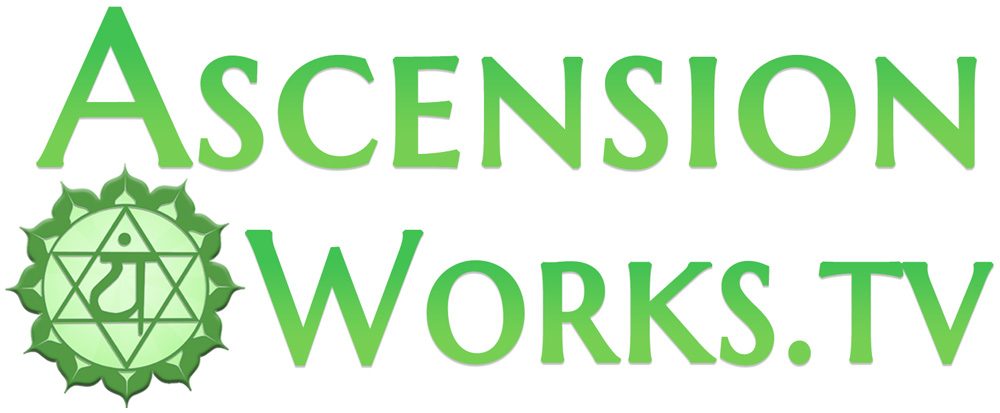
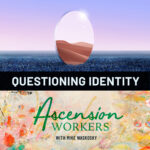
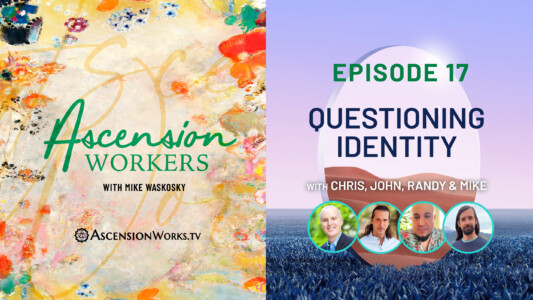
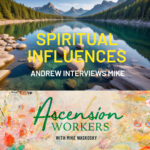
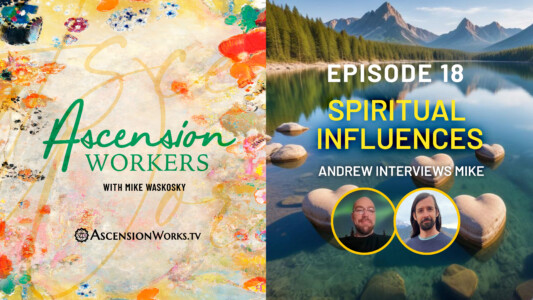
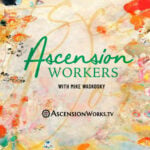
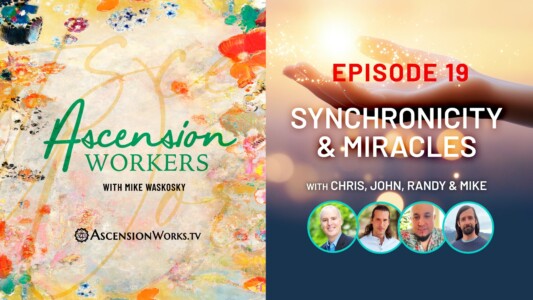
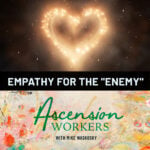
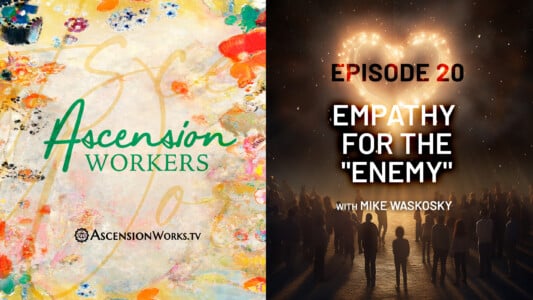


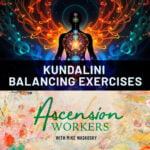
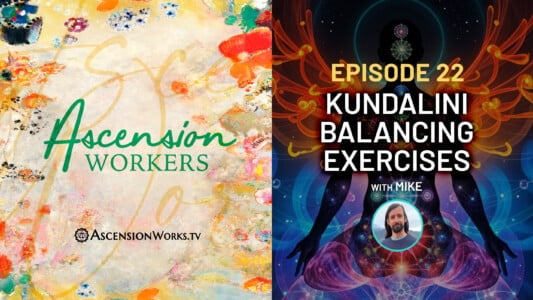
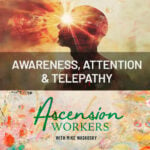
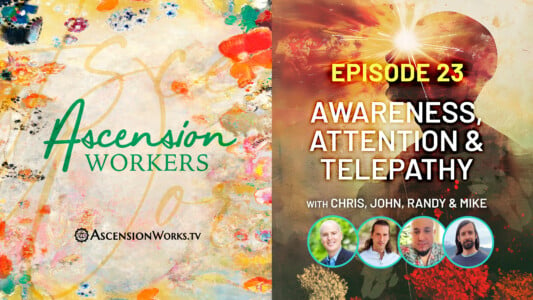
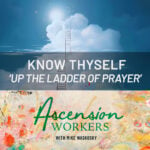
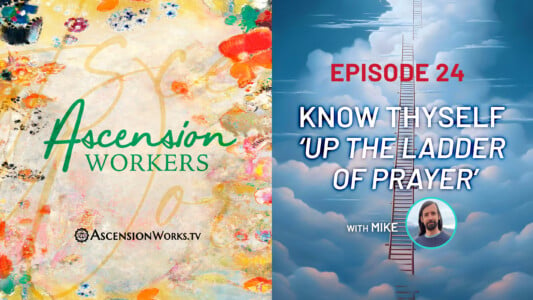


Responses